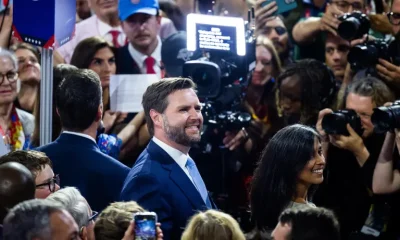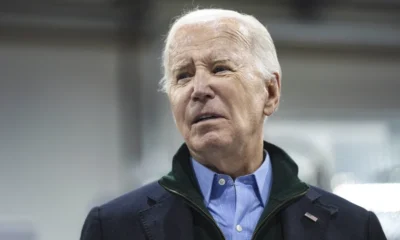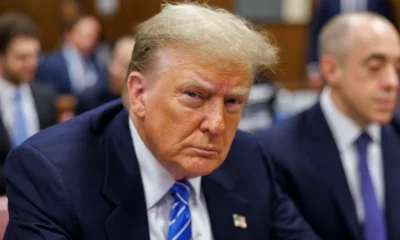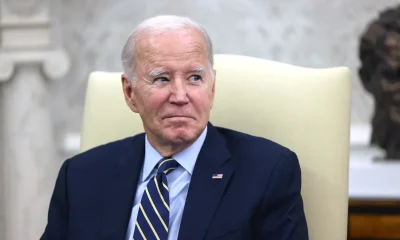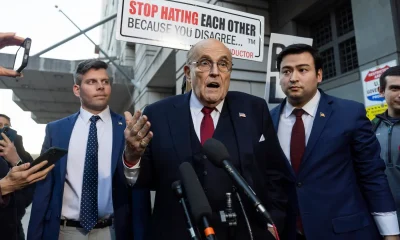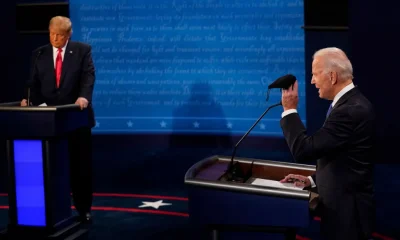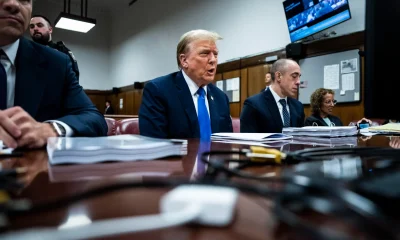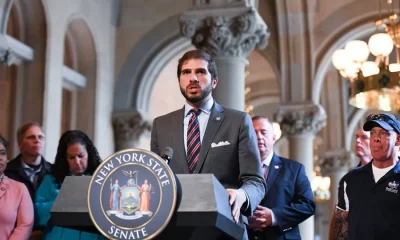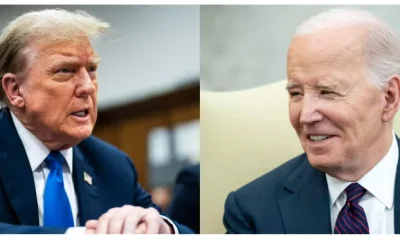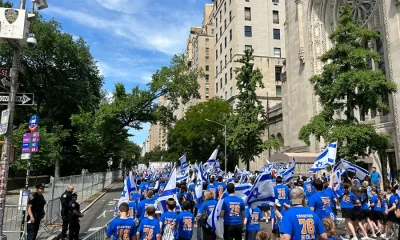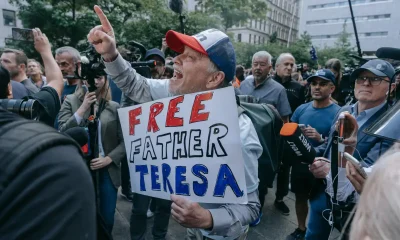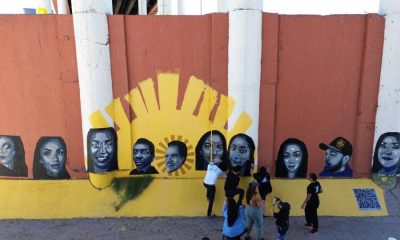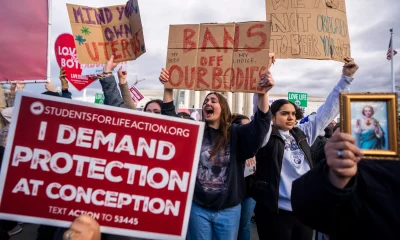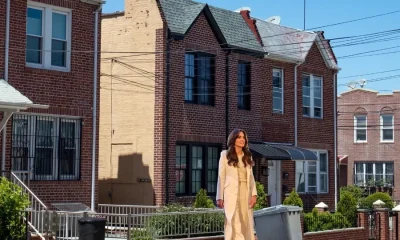International
New York boasts of a migration model but criticizes the lack of federal support
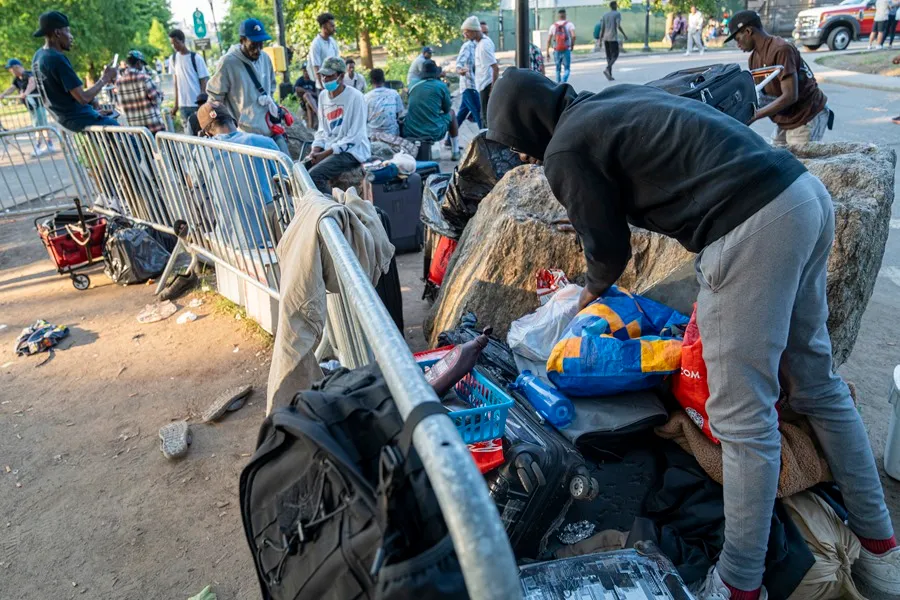
New York City boasts of a migration model having received and integrated more than 200,000 irregular immigrants in the last two years, but complains about the null support received from the federal government of Washington, trapped in an electoral logic where the migration issue has become political dynamite.
“Our support network is better than the one they find in any other city and state, and we are proud to have been able to specifically support all these people, who already total 202,000, but the burden is only ours and we do not see enough support from the federal government,” the city’s Immigration Commissioner, Manuel Castro, says in an interview with EFE.
Castro embodies like few others the famous ‘American dream’: he arrived in New York from Mexico as undocumented at the age of only five, and three decades later, after a youth dedicated to activism in favor of asylum seekers, he became the top immigration leader of New York, the city “raised by immigrants,” as he himself remembers.
Two years ago, the Republican governor of Texas, Greg Abbott, devived the ‘bus strategy’, which consisted of filling these vehicles with newly arrived immigrants from Mexico and sending them to what he called ‘progressive cities’ with the promise that they would receive accommodation and food there. It was not a lie in the case of New York: a rule from 50 years ago forces the city not to leave anyone homeless.
In the following months, New York declared a ‘humanitarian crisis’ but it did not stop providing assistance to the thousands of people who arrived not only from Texas, but from other states attracted by the generosity that the city deployed with immigrants: roof for everyone, school for minors and medical expenses.
The attention to all these people made the city calculate an extra expense of 10 billion dollars between 2022 and 2025, which it faced “without the support of the federal government, even though it should be a responsibility shared with the other cities and states,” Castro recalls.
The city was “obliged” – in the words of the Commissioner – to limit the stay in public shelters to one or two months, depending on the circumstances, through an exceptional judicial remedy, but guaranteed that families with children were not evicted in any case.
However, and as EFE has been able to verify in the giant camp of Randall’s Island, where adults without a family are sent, the law is applied in a very flexible way and there are several tenants who have been looking for more than four months, while looking for a work permit that never arrives.
And it is that another of the problems they face is the enormous slowness of bureaucratic efforts to obtain asylum status and/or a work permit, which usually takes more than 12 months, and that forces many immigrants to fall into the underground economy, usually in street sales or as delivery people of food on a bicycle.
“The emigration system doesn’t work,” Castro reflects. There is a great demand for jobs and it would be logical for us to support them with a work permit. We have been without a solution to these problems for decades, it is an inadequate system and Congress should act,” he insists, although he recognizes that the proximity of the electoral appointment complicates everything.
Castro regrets that all the attention paid to immigrants is now the victim of two opposing narratives: “On the one hand, they tell us that we are not doing enough for immigrants, that we have a moral obligation not to abandon them; on the other, they accuse us of giving them too much, and the more we give them, the more they will come,” he explains.
“It is symbolic of what is happening in the country, there is too much political division,” he believes, recognizing that in the year of elections the issue has become especially thorny, with a Republican candidate like Donald Trump who “with his threats of mass deportations is generating a huge fear and uncertainty,” and makes some immigrants not dare to go to a health center or a police station for fear of expulsion.
International
U.S. Senate Rejects Budget, Bringing Government Closer to Shutdown Amid DHS Dispute

The U.S. Senate voted on Thursday against a budget proposal in a move aimed at pressuring changes at the Department of Homeland Security (DHS), following the killing of two civilians during a deployment of immigration agents in Minneapolis.
All Senate Democrats and seven Republican lawmakers voted against the bill, which requires 60 votes to advance, pushing the country closer to a partial government shutdown that would cut funding for several agencies, including the Pentagon and the Department of Health.
The rejection came as Senate leaders and the White House continue negotiations on a separate funding package for DHS that would allow reforms to the agency. Proposed measures include banning Immigration and Customs Enforcement (ICE) agents from wearing face coverings and requiring them to use body-worn cameras during operations.
The vote took place just hours after President Donald Trump said he was “close” to reaching an agreement with Democrats and did not believe the federal government would face another shutdown, following last year’s record stoppage.
“I don’t think the Democrats want a shutdown either, so we’ll work in a bipartisan way to avoid it. Hopefully, there will be no government shutdown. We’re working on that right now,” Trump said during a Cabinet meeting at the White House.
International
Trump Says Putin Agreed to One-Week Halt in Attacks on Ukraine Amid Extreme Cold

U.S. President Donald Trump said on Thursday that he secured a commitment from Russian President Vladimir Putinto halt attacks against Ukraine for one week, citing extreme weather conditions affecting the region.
“Because of the extreme cold (…) I personally asked Putin not to attack Kyiv or other cities and towns for a week. And he agreed. He was very pleasant,” Trump said during a Cabinet meeting broadcast by the White House.
Trump acknowledged that several advisers had questioned the decision to make the call.
“A lot of people told me not to waste the call because they wouldn’t agree. And he accepted. And we’re very happy they did, because they don’t need missiles hitting their towns and cities,” the president said.
According to Trump, Ukrainian authorities reacted with surprise to the announcement but welcomed the possibility of a temporary ceasefire.
“It’s extraordinarily cold, record cold (…) They say they’ve never experienced cold like this,” he added.
Ukrainian President Volodymyr Zelensky later commented on the announcement, expressing hope that the agreement would be honored.
International
Storm Kristin Kills Five in Portugal, Leaves Nearly 500,000 Without Power

Storm Kristin, which battered Portugal with heavy rain and strong winds early Wednesday, has left at least five people dead, while nearly half a million residents remained without electricity as of Thursday, according to updated figures from authorities.
The revised death toll was confirmed to AFP by a spokesperson for the National Emergency and Civil Protection Authority (ANPEC). On Wednesday, the agency had reported four fatalities.
Meanwhile, E-Redes, the country’s electricity distribution network operator, said that around 450,000 customers were still without power, particularly in central Portugal.
Emergency services responded to approximately 1,500 incidents between midnight and 8:00 a.m. local time on Wednesday, as the storm caused widespread disruptions.
The Portuguese government described Kristin as an “extreme weather event” that inflicted significant damage across several regions of the country. At the height of the storm, as many as 850,000 households and institutions lost electricity during the early hours of Wednesday.
Several municipalities ordered the closure of schools, many of which remained shut on Thursday due to ongoing adverse conditions.
Ricardo Costa, regional deputy commander of the Leiria Fire Brigade, said residents continue to seek assistance as rainfall persists.
“Even though the rain is not extremely intense, it is causing extensive damage to homes,” he noted.
In Figueira da Foz, a coastal city in central Portugal, strong winds toppled a giant Ferris wheel, underscoring the severity of the storm.
-

 Central America4 days ago
Central America4 days agoGuatemala Police Arrest Prison Guard Caught in the Act of Extortion
-

 Central America4 days ago
Central America4 days agoHonduras swears in conservative president Asfura after disputed election
-

 Central America4 days ago
Central America4 days agoBukele leads public trust rankings as UCA survey highlights gains in security
-

 International3 days ago
International3 days agoFootball Fan Killed in Clashes After Colombian League Match
-

 Central America3 days ago
Central America3 days agoGuatemala President Says Starlink Terminal Found Inside Prison
-

 International4 days ago
International4 days agoDoomsday clock moves to 85 seconds before midnight amid rising global risks
-

 International2 days ago
International2 days agoU.S. Senate Rejects Budget, Bringing Government Closer to Shutdown Amid DHS Dispute
-

 International4 days ago
International4 days agoWinter Storm Fern Leaves 30 Dead and Over One Million Without Power Across the U.S.
-

 Sin categoría4 days ago
Sin categoría4 days agoEight Killed in Series of Armed Attacks in Ecuador’s Manabí Province
-

 International4 days ago
International4 days agoSpain approves plan to regularize up to 500,000 migrants in Historic Shift
-

 International3 days ago
International3 days agoMissing Spanish Sailor Rescued After 11 Days Adrift in Mediterranean
-

 International3 days ago
International3 days agoRubio Says U.S. Could Participate in Follow-Up Russia-Ukraine Talks
-

 Sin categoría4 days ago
Sin categoría4 days agoEl Salvador Launches Fourth Year of Ocean Mission to Protect Marine Ecosystems
-

 Central America1 day ago
Central America1 day agoPanama Supreme Court Strikes Down Panama Ports Concession as Unconstitutional
-

 International2 days ago
International2 days agoStorm Kristin Kills Five in Portugal, Leaves Nearly 500,000 Without Power
-

 Central America1 day ago
Central America1 day agoU.S. and Guatemala Sign Trade Deal Granting Zero Tariffs to Most Exports
-

 International2 days ago
International2 days agoTrump Says Putin Agreed to One-Week Halt in Attacks on Ukraine Amid Extreme Cold
-

 International2 days ago
International2 days agoMan Arrested After Vehicle Crashes Into Jewish Institution in Brooklyn

























